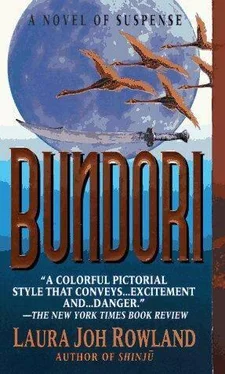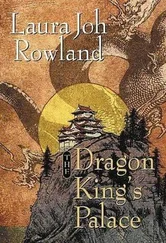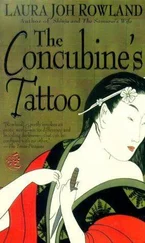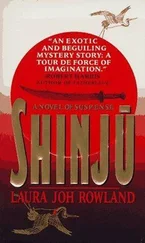
Laura Joh Rowland
Bundori: A Novel Of Japan
Sano Ichirō Samurai Detective 02
In memory of my grandparents:
Day Hung and Susanna Job
Gow Sing and Quon Gin Lee
EDO
GENROKU PERIOD, YEAR 2, MONTH 3
( Tokyo , April 1689 )
As the hour of the boar approached, the great city of Edo lay shrouded in a heavy mist that blurred the darkness and muffled sound. A thin spring rain pattered onto the tile roofs of the Nihonbashi merchant quarter, puddling the narrow streets. Yellow lamplight glowed faintly behind the wooden lattices and paper panes of only a few windows; smoke from charcoal braziers rose to mingle with the mist and thicken the air still more. Although the city’s many gates had not yet closed, blocking off passage from each section to the next, the streets were already as deserted as if midnight-nearly three hours away-had already arrived.
The lone stalker emerged from the shelter of a recessed doorway in a row of shopfronts whose sliding wooden shutters were closed tight against the hostile weather. The dank chill penetrated his cloak and seeped between the plates of the armor tunic beneath it. Cold moisture gathered under his wide-brimmed hat and inside the iron mask that covered his face. His body, already tense with anticipation, began to shiver. With each shallow breath, he inhaled and exhaled air that smelled of damp wood and earth and the fishy taint of the Sumida River. Keeping to the shadows beneath the roofs’ overhanging eaves, he moved sideways, stealthily, until he reached the next doorway. There he paused, all his senses alert for the first sign of his prey.
Moments passed. The night noises-voices from inside nearby houses, distant hoofbeats, the clatter of the night-soil carts making their way toward the fields outside town-gradually ceased as Edo prepared for the closing of the gates and the captivity it would endure until dawn. Quivering with impatience, the stalker peered down the street. His fingers traced the flat guards, shaped like human skulls, of his swords. Would the enemy appear tonight? Would he at last achieve the goal postponed for so many years?
The mist allowed him to see no farther than ten paces in any direction. To his right, he could barely discern the murky glow of a torch that lit the gate at the street’s end. The night seemed empty of all movement and presence save his own. Frustration mounted; blood lust consumed him in waves of hot desire. As he waited, his fevered mind projected images at first vague, then more distinct, against the mist’s dense blankness. If he squinted-there, just so- he could imagine himself back through the years to that time about which he’d heard so much that he knew it almost as well as his own. The time of constant and glorious civil war, before the village of Edo had burgeoned into a city of one million inhabitants; before the first Tokugawa shogun, Ieyasu, had subjugated his rivals and imposed peace upon the land.
The time of the greatest warlord who had ever lived.
☼
Kiyosu Fortress, one hundred and twenty-nine years ago. A merciless summer sun blazed down upon the two thousand samurai sheltered within the wooden walls of the stockade. The stalker, though among the humblest of the foot soldiers, felt the unease that permeated their pitifully small army. This day could mean victory and life-or defeat and death-for them all.
“He’s coming!”
The words, whispered from one man to the next, passed through the ranks. Along with his comrades, the stalker knelt and bowed, arms extended, forehead to the ground. But he couldn’t resist a quick glance upward as their feared and beloved lord passed.
Oda Nobunaga, lord of Owari Province, with ambitions of someday ruling the entire land, was resplendent in a suit of armor made from hundreds of metal and leather plates tied together with blue silk cord and lacquered in brilliant colors, and wearing a black iron helmet crowned with a pair of carved golden horns. He rode a magnificent black steed. His expression grave, he dismounted to confer with the three generals who accompanied him into the whitewashed wooden fort.
Another whisper swept the ranks: “Marune has fallen!” Dread paralyzed the stalker. He gasped with the others. With the capture of Lord Oda’s frontier fortress, nothing stood between them and the enemy Lord Imagawa’s troops, twenty-five thousand strong, who were advancing on them even now. They were doomed. But his fear for Lord Oda overshadowed that which he felt for himself.
☼
The sound of footsteps jolted him back to the present. Relinquishing his lingering terror and the image of the imperiled fortress, he looked into the street. Out of the mist to his left shuffled an elderly samurai, with the customary swords, one long and one short, at his waist.
The stalker savored the heady rise of excitement as he grasped the hilt of his own long sword. Trembling, he waited for the man to draw nearer. He focused his thoughts on the confrontation ahead. But a part of his mind leapt backward to that morning long past.
☼
The fortress gates opened to admit two panting scouts. “Imagawa’s army is in the gorge outside Okehazama village!” they cried, hurrying to convey the news to Lord Oda.
Almost before the stalker or his comrades could comprehend the significance of this information, they were on the march. All two thousand of them, so few compared to the massive force that awaited them, mounted and on foot; first banner-bearers, gunners, and archers, then the swordsmen and spear-carriers, with Lord Oda and the generals bringing up the rear. They sweltered in the heat that baked the hills and rice fields.
Midday came. At last they stopped behind a hill just short of the gorge and waited for the command to act. From inside the gorge, the stalker could hear voices raised in drunken laughter and song. Imagawa’s troops were celebrating their earlier victory. He listened and waited some more. A tense hush gripped the hillside and held him motionless, afraid to breathe.
Suddenly a mass of dark storm clouds boiled up out of the west, hiding the sun. Lightning split the sky; thunder shook the earth like the beat of a great war drum. The first raindrops pelted the earth. As if on this signal from the heavens, Lord Oda raised his great gold war fan and brought it down again, cleaving the air in a decisive motion. The conch trumpet blared the order:
Charge!
In one movement, they rose and ran toward the gorge. Great sheets of rain lashed the stalker as he struggled against the wind. Ahead of him, the first rank had disappeared into the gorge. He heard the boom of gunfire and the startled cries of Imagawa’s army. Then, his heart pounding louder than the thunder, he skidded down the slope and into the swirling chaos that filled the gorge.
The storm had driven Imagawa’s men to seek shelter under trees. Now they scrambled to load drenched and useless arquebuses, groped for bows, spears, and swords lost in the mud. But it was too late. Oda’s troops fell upon them, slaughtering them by the hundreds. The clash of steel blades echoed up and down the gorge. Guns roared, emitting clouds of black smoke. Arrows sang through the air to strike flesh with meaty thumps. Screams of death agony echoed the attackers’ murderous shouts. The metallic scent of blood overpowered the summer smells of sweat and rain. Into the raging battle rode Lord Oda. Sword raised high, he made straight for Lord Imagawa, who stood alone and unprotected. One expert slash of Oda’s sword, one triumphant yell, and Imagawa lay dead.
Читать дальше













